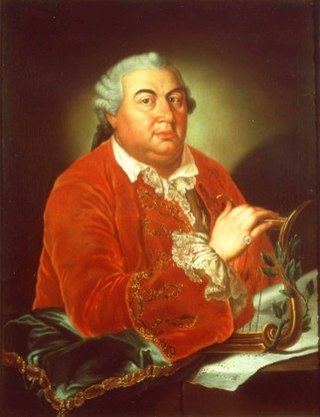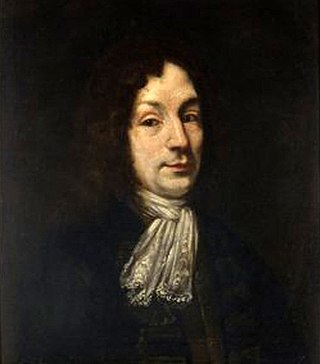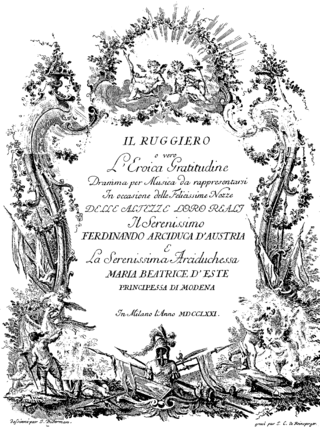| Year | Composer | Premiered | First performed |
|---|
| 1731 | Antonio Caldara | 4 November 1731, Hoftheater [1] [3] [Digital 1] for the celebration of the name day of Emperor Charles VI; also at the winter fair 1734 at the Hoftheater in Brunswick. | Vienna |
| 1732 | Giovanni Antonio Giay | Carnival 1732, Teatro delle Dame [4] [Digital 2] also Carnival 1735 at the Teatro de' Nobili in Perugia | Rome |
| 1732 | Johann Adolph Hasse | 10 February 1732, Teatro San Giovanni Crisostomo [5] Reworked many times, also performed as Cleonice; many other adaptations in other Italian cities; 1737 in Ferrara in a reworking by Antonio Vivaldi; [6] 8 February 1740 at the Hoftheater in Dresden; 1767 in Kassel | Venice |
| 1732 | Antonio Bioni | June 1732, Theater im Ballhaus [7] | Wrocław |
| 1732 | de:Gaetano Maria Schiassi | 28 August 1732, Teatro Regio Ducale [8] for the birthday of Elisabeth Christine of Brunswick-Wolfenbüttel; also in 1739 at the Teatro Condes in Lisbon | Milan |
| 1732 | Leonardo Leo | 1 October 1732, Teatro San Bartolomeo [9] [Digital 3] first version | Naples |
| 1732 | Giovanni Battista Pescetti | 26? December 1732, Teatro della Pergola [10] [Digital 4] also February 1737 at the King's Theatre Haymarket in London | Florence |
| 1734 | Francesco Araja | May 1734, Teatro delle Grazie [11] possibly together with Leonardo Leo | Vicenza |
| 1735 | Leonardo Leo | 10 December 1735, Teatro del Castello [12] second version; also 1738 at the Teatro San Carlo in Naples; Riccardo Broschi named as another composer of this lost work | Torremaggiore |
| 1736 | de:Giovanni Battista Mele | 31 January 1736, Teatro del la Cruz [13] Libretto adapted by D. Vincente de Camacho as Por amor y por lealtad recobrar la majestad in two acts | Madrid |
| 1736 | Geminiano Giacomelli | Carnival 1737, Teatro Regio [14] | Turin |
| 1741 | Davide Perez | 13 June 1741, Teatro di Santa Cecilia [15] [16] [17] first version; also 18 December 1748 under the pseudonym "Egidio Lasnel" (possibly his mentor Diego Naselli) at the Teatro San Carlo in Naples; 1751 at the Teatro San Samuele in Venice; 1753 in Lodi | Palermo |
| 1741 | Leonardo Leo | 19 December 1741, Teatro San Carlo [18] third version; also 30 December 1741 at the Teatro Argentina in Rome | Naples |
| 1742 | Angelo Antonio Caroli | 16 January 1742, Teatro Formagliari [19] [Digital 5] as Il Demetrio re della Siria | Bologna |
| 1742 | Christoph Willibald Gluck | 2 May 1742, Teatro San Samuele [20] Only eight arias survive; also performed as Cleonice; also 3 February 1749 at San Lazzaro dei Mendicanti in Venice | Venice |
| 1742 | Giuseppe Carcani | 23 September 1742, Teatro civico [21] | Crema |
| 1742 | Francesco Maggiore | Autumn 1742, Theater am Tummelplatz [22] Written together with other composers, adapted for Carnival 1749 at the Teatro Filarmonico in Verona | Graz |
| 1744 | de:Paolo Scalabrini | 1744, Oper am Gänsemarkt [23] [Digital 6] Some arias by other composers. Also performed in 1747 in Leipzig | Hamburg |
| 1744 | Giovanni Battista Lampugnani | 28 April 1744, King's Theatre, Haymarket [24] Libretto adapted by Paolo Antonio Rolli as Alceste | London |
| 1744 | anonymous | 26 October 1744, Teatro della Pergola [25] Other performances of anonymous settings or pasticcio settings in 1751 at the Palazzo Ducale in Modena; 18 May 1757 at the Teatro San Salvatore in Venice; 19 August 1769 at the Teatro in Lucca; 26 November 1763 as Cleonice, regina di Siria at King's Theatre Haymarket in London | Florence |
| 1746 | Egidio Romualdo Duni and/or Georg Christoph Wagenseil | 26 December 1746, Teatro della Pergola [26] also Carnival 1760 at the Teatro Regio Ducale in Milan | Florence |
| 1748 | Baldassare Galuppi | 16 or 27 October 1748, Burgtheater [27] first version | Vienna |
| 1748 | (de) Pietro Pulli | 26 December 1748, Teatro Regio Ducale [28] [Digital 7] | Milan |
| 1749 | Niccolò Jommelli | Spring 1749, Teatro Ducale [29] [Digital 8] [Digital 9] [Digital 10] [Digital 11] adapted 1751 at the Real Teatro del Buen Retiro in Madrid; 1753 at the Hoftheater Mannheim | Parma |
| 1750 | Gaetano Piazza | Carnival 1750, Teatro Omodeo [30] | Pavia |
| 1751 | Vincenzo Pallavicini | Carnival 1751, Teatro dell'Accademia degli Erranti [31] | Brescia |
| 1751 | Lorenzo Gibelli | October 1751, Teatro Solerio [32] | Alessandria |
| 1752 | Giuseppe Scarlatti | 11 June 1752, Teatro Nuovo [33] | Padua |
| 1753 | Ignazio Fiorillo | Summer 1753, Hoftheater [34] | Brunswick |
| 1757 | Gioacchino Cocchi | 1757, King's Theatre Haymarket [35] as Demetrio, re di Siria; together with other composers; also 8 November 1757 at the Teatro Marsigli-Rossi in Bologna | London |
| 1758 | Giovanni Battista Ferrandini | Carnival 1758, Hoftheater [36] | Munich |
| 1758 | Salvatore Perillo | 1758, Teatro Dolfin [37] also Carnival 1761 at the Teatro Filarmonico in Verona | Treviso |
| 1759 | Giuseppe Ponzo | Carnival 1759, Teatro Falcone [38] [Digital 12] also 3 May 1760 at the Teatro Comunale in Reggio nell'Emilia; Carnival 1762 at the Teatro Regio in Turin | Genoa |
| 1759 | Giacomo Insanguine | Carnival 1759, Teatro Capranica [39] [Digital 13] | Rome |
| 1760 | Johann Ernst Eberlin | 1760 [40] | |
| 1761 | Baldassare Galuppi | June 1761, Teatro Nuovo [27] second version | Padua |
| 1762 | Nicola Sala | 12 December 1762, Teatro San Carlo [41] | Naples |
| 1763 | Antonio Costantini | 17 July 1763, Teatro Condominiale [42] attribution unsure | Senigallia |
| 1765 | Davide Perez | Carnival 1765, Teatro de Salvaterra [43] second edition | Lisbon |
| 1767 | Pasquale Vinci | Carnival 1767, Teatro Filarmonico [44] together with other composers | Verona |
| 1768 | Antonio Gaetano Pampani | Ascension Day 1768, Teatro San Benedetto [45] | Venice |
| 1769 | Carlo Monza | 3 January 1769, Teatro delle Dame [46] also Carnival 1774 at the Teatro dell'Aquila in Foligno | Rome |
| 1769 | Niccolò Piccinni | 30 May 1769, Teatro San Carlo [47] [Digital 14] also 6 January 1772 at the Teatro de la Santa Cruz in Barcelona | Naples |
| 1771 | Giovanni Paisiello | Carnival 1771, Teatro di Corte [48] First version; also Carnival 1771 at the Teatro Nazari in Cremona and 1771 at the Royal Theatre, Prague | Modena |
| 1772 | Andrea Bernasconi | Carnival 1772, Hoftheater [49] [Digital 15] | Munich |
| 1772 | Pietro Alessandro Guglielmi | 3 June 1772, King's Theatre Haymarket [50] Libretto adapted by Giovan Gualberto Bottarelli; also Summer 1775 at the Teatro San Benedetto in Venice | London |
| 1773 | Josef Mysliveček | 24 May 1773, Teatro Nuovo [51] [Digital 16] first version | Pavia |
| 1774 | Francesco Bianchi | Carnival 1774 [52] [Digital 17] also Carnival 1780 at the Teatro San Benedetto in Venice; Carnival 1789 at the Teatro Filarmonico in Verona | Cremona |
| 1777 | de:Anton Adam Bachschmid | 1777, de:Raymund Anton von Strasoldo [53] | Eichstätt |
| 1779 | Giovanni Paisiello | 1/12 June 1779, Hoftheater [54] Paisiello|Demetrisecond version, in two acts | Zarskoje Selo |
| 1779 | Josef Mysliveček | 13 August 1779, Teatro San Carlo [55] [Digital 18] [Digital 19] second version | Naples |
| 1780 | Giuseppe Giordani | Carnival 1780, Teatro di Corte [56] | Modena |
| 1785 | Luigi Cherubini | 1785, King's Theatre Haymarket [57] | London |
| 1786 | Antoine-Frédéric Gresnick | 23 December 1786, King's Theatre Haymarket [40] [58] Libretto adapted by Carlo Francesco Badini as Alceste | London |
| 1787 | Angelo Tarchi | 1787, Teatro alla Scala [59] | Milan |
| 1790 | Luigi Caruso | Spring 1790 [60] | Venice |
| 1823 | Johann Simon Mayr
→ Demetrio (Mayr) | 27 December 1823, Teatro Regio [61] [Digital 20] Libretto probably also adapted by Lodovico Piossasco Feys into a two-act version. | Turin |
| 1828 | Alessandro Gandini | Autumn 1828, Teatro di Corte [62] in two acts | Modena |
| 1840 | Baltasar Saldoni | 1840, Teatro del la Cruz [63] [Digital 21] as Cleonice, regina di Siria | Madrid |


















